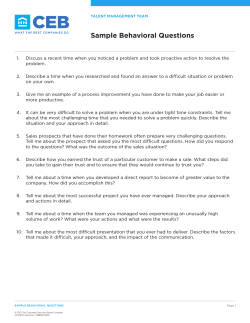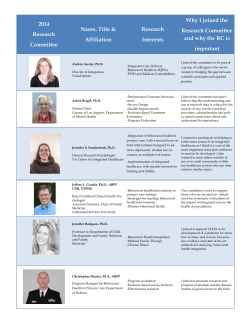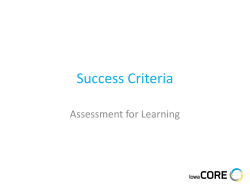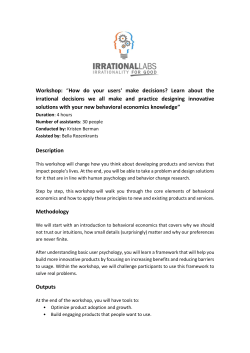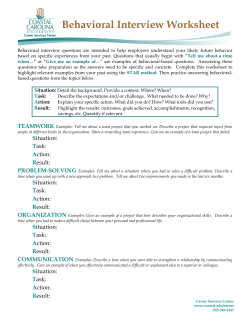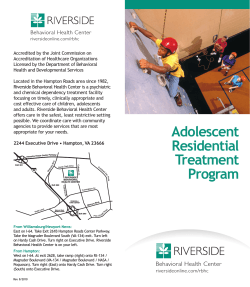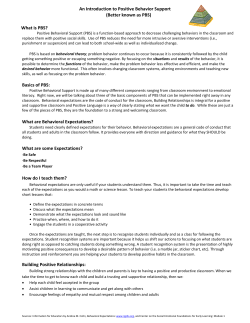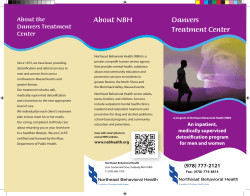
Comprehensive Behavioral Health Model Prospectus
Comprehensive Behavioral Health Model Prospectus “This work to address the critically important issues surrounding the mental health of our students… is some of the most difficult work happening in American public education today and we don’t say thank you nearly enough. As the Secretary of Education and as a Boston Public School parent, it is inspiring to see this type of collaboration happening for the benefit of our kids.” MA SECRETARY OF EDUCATION MATTHEW H. MALONE Dear Friend of Behavioral Health, At Boston Public Schools, we clearly understand the connection between behavioral health and students’ ability and potential to learn. The Comprehensive Behavioral Health Model provides a framework for ensuring that all students in Boston Public Schools have access to high quality and coordinated behavioral and mental health supports. It promotes positive school climate and social and academic success for all students. It integrates tiered supports and services within a school according to student needs, and recognizes family and community partnerships as an integral part of a school’s success. We are proud that BPS is leading this work in the state. Schools need a behavioral health framework. We are extraordinarily happy to have Andria Amador and the Behavioral Health Services staff leading this work in BPS, and CBHM exists because of and is strengthened by the essential support and partnership of Boston Children’s Hospital and UMass-Boston, as well as our many community partners. We are confident that each day our schools are better places because adults are working together to support children and families to ensure that our students are at the table and learning. We are excited about the continued growth and impact of CBHM on our students, our schools, and BPS as a whole. We very much appreciate your interest and support. John McDonough SUPERINTENDENT OF BOSTON PUBLIC SCHOOLS 1 BPS Comprehensive Behavioral Health Model Supportive and Successful Schools A Teacher’s Perspective The Comprehensive Behavioral Health Model As part of CBHM, the screening process takes (CBHM) is a multi-tiered system of supports our intangible experiences in our classrooms and designed to ensure that all Boston Public School converts them into practice-based evidence that students have access to high quality and coordinat- helps us best serve students. The screening ed behavioral and mental health supports. Imple- process gives service providers a nuanced picture mentation of CBHM began during the 2012- 2013 of each student’s academic and behavioral skills, school year and is now in 31 schools. A new cohort as well as composite data on a classroom and of schools will be added each school year. school. The data helps teachers view our students CBHM advances the development of safe and sup- through multiple lenses and identify specific skills portive school environments that are equipped to that a student needs rather relying solely on respond to varying levels of behavioral and men- anecdotes or observations. As part of CBHM, tal health need. Universal interventions benefit all the process provides resources to regularly students, and targeted and intensive supports are progress monitor students using the Response to implemented for students with higher levels of need. Intervention model. CBHM provides an important The Comprehensive Behavioral Health Model was developed by the BPS Behavioral Health Services foundation for establishing a school culture that values student-centered teaching and learning. Department, with support from and in collaboration with Boston Children’s Hospital and UMass-Boston. 2 CBHM: Number of Students Served 19000 17115 18000 16000 14000 10743 12000 10000 8000 6564 6000 4000 2000 0 2012-13 3 2013-14 2014-15 Need and Accomplishments There is a growing body of research demonstrating the impact of student behavioral health on academic success. As schools and school districts develop well-defined academic benchmarks, many still lack a comprehensive plan to adequately address the behavioral health needs of students. The behavioral health needs of children in Boston are vast. Approximately a quarter have experienced an adverse childhood experience, including exposure to violence in the home or in the community, chronic poverty, living in a home where substance abuse is present, or chronic mental health issues. Research shows that adverse childhood experiences have the potential for long-term negative impact on academic achievement, mental heath, school attendance, and lifelong physical health. The Jackson-Mann K-8 School The Jackson-Mann School’s adoption of the Comprehensive Behavioral Health Model in 2012-13 catalyzed its efforts to improve the school climate. Since that time, it has seen an improvement in school climate, increased attendance, and a decline in suspensions. Key to this school-wide success has been the implementation of the Second Step social-emotional learning program and the articulation of the TIGER traits (Tolerance, Integrity, Generosity, Encouragement, Respect) as a reflection of school values. TIGER is visually and verbally represented and reinforced throughout the school, and TIGER paws are used to recognize students at monthly assemblies. Edwin was so proud of his paw that he took the initiative to bring it home and frame it, and then brought it back to school to show his friends and teachers. 4 Goals The goal of the Comprehensive Behavioral Health Model is to create safe and supportive learning environments in which students grow and thrive academically, personally, and socially. In the next 3 years, we plan to increase our model and its implementation in over 30 additional schools across the district, while we continue to monitor and evaluate our progress in participating schools. BPS COMPREHENSIVE BEHAVIORAL HEALTH MODEL MISSION: Ensuring that all students have a safe and supportive school where they can be successful If we do this… We will see this… Universal screening and positive skill instruction Improved academic performance Access to targeted supports and services Increased positive behaviors Integrated academic and socio-emotional learning Improved school climate and student engagement Professional development on evidence-based interventions Increased skills to address students’ needs Data management and accountability Increased capacity to provide services Partnerships with families and community agencies Improved access to and coordination of services To achieve this… STUDENTS SCHOOLS DISTRICT ESSENTIAL COMPONENTS Collaboration with and support for families Aligned district initiatives and policies Data-based decision making Appreciation for diversity Academic and social competence Safe and supportive learning environments High-quality equitable behavioral health services Consultation and collaboration School and district leadership Student-centered Differentiated instruction Guided by Massachusetts Department of Elementary and Secondary Education’s Behavioral Health Framework THEORY OF CHANGE: Integrating behavioral health services into schools will create safe and supportive learning environments that optimize academic outcomes for all students. 5 BEHAVIORAL HEALTH SERVICES DEPT OF C HILDREN & BLIC MMISSION HEALTH CO SPECIALIZED SERVICES NT OF DEPARTME MENTAL HE ALTH MENTAL HE ALTH PARTN ERS Individual Counseling Crisis Reponse VID D P RO Consultation H LY Evidence-Based Interventions EN LY Universal Positive Behavioral Supports TER SIT AR TIER 1 QU Y A N Solution-Focused Groups NT TIER 2 MO ER EXP Y EKL ERT Case Management WE ISE TIER 3 INT BOSTON PU FAMILY SER VICES Universal Behavioral Health Screening Professional Development FOUNDATIONAL PRACTICES OF MENTAL HEALTH SERVICE DIRECTORY Data-Based Decision Making Research-Based Interventions Consultations and Collaboration Inclusive Practices 6 Student Outcomes: The Comprehensive Behavioral Health Model is making an impact in participating schools. The 10 schools that began CBHM in 2012-13 demonstrated an increase in positive behaviors and a decrease in problem behaviors based on the universal screening data. Capacity Outcomes: To sustain the positive change with students, the capacity of school-based staff to address behavioral health needs was enhanced with over 100 hours of professional development training. Evaluation data indicates that participants learned new strategies for behavioral and academic screening and interventions, identified targeted interventions to meet student needs, and increased confidence to address student needs. Overall, school staff indicated they were satisfied with the trainings, and rated them highly (4.3 out of 5). 7 Increase in percentage of students with reduced risk for Negative Affect 70 68 66 64 62 60 2012-13 2013-14 Decrease in percentage of students with increased risk for Negative Affect 12 10 8 6 4 2 0 2012-13 2013-14 Negative Affect entails signs of depression or anxiety that impact students’ ability to learn and succeed in school. Decrease in percentage of students with increased risk for Conduct problems 12 10 8 6 4 2 0 2012-13 2013-14 Conduct entails signs of behavioral difficulties in the classroom that impact students’ ability to learn and succeed in school. 8 Partners The Boston Children’s Hospital Neighborhood Partnerships Program is the community mental health program in the Department of Psychiatry at Boston Children’s Hospital. For more than 10 years, CHNP has placed social workers, psychologists, and psychiatrists in schools and community health centers throughout Boston to provide a comprehensive array of mental health services to children and adolescents where they live and learn. With a growing reputation for innovative research addressing complex issues, the University of Massachusetts Boston, metropolitan Boston’s only public university, offers its diverse student population both an intimate learning environment and the rich experience of a great American city. UMass Boston’s 11 colleges and graduate schools serve 16,000 students while engaging local, national, and international constituents through academic programs, research centers, and public service activities. 9 For more information, please contact: Andria Amador 617-635-9676 aamador@bostonpublicschools.org cbhmboston.com
© Copyright 2025
